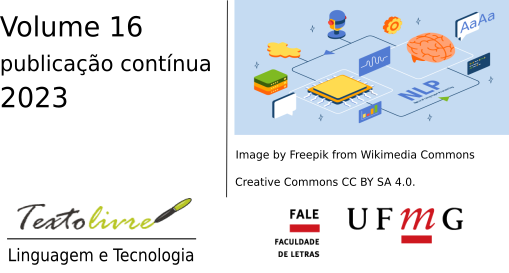The Automated Guided Vehicle as a mathematical learning microworld
a constructionist perspective
DOI:
https://doi.org/10.1590/1983-3652.2023.46113Keywords:
Creative intelligence, Educational robotics, Microworld, Mathematical learningAbstract
The article sought to explore, from a constructionist perspective, the Automated Guided Vehicle (AGV) as a Microworld for mathematical learning. Its constitution took place from qualitative exploratory research, in which an overview of the object is offered. In this process, bibliographical research was conducted, based on studies by authors such as Seymour Papert, Pierre Lèvy and marked by experimentation based on Guimarães, Silva e Barbosa (2020). Thus, the objective was to study the feasibility of adopting AGV as a Microworld for mathematical learning, from the perspective of bricolage, simulation, and creative intelligence. The experience with the construction of AGV is more than the construction of a robot, it is the affirmation of the importance of Mathematics, virtual simulation in the conception of the real, and the tangible.
Downloads
References
ALVES, Mônica da Cunha. A Construção de um Robô Seguidor de Linha na Perspectiva da Robótica Livre: uma possibilidade de abordagem do ensino de matemática. 2022. 69f. Dissertação (Mestrado) – Programa de Mestrado Profissional em Matemática em Rede Nacional, Universidade Federal de Catalão, Catalão, 2022. Cap. 4. Disponível em: https://shre.ink/ateF. Acesso em: 5 mar. 2022.
BORNATTO, Gilmar. Modelagem - Simulação - Informática e a Matemática. Revista PEC, Curitiba, v. 2, n. 1, p. 67–71, 2022. Disponível em: https://shre.ink/atPa. Acesso em: 5 mar. 2022.
BORSA, Juliane Callegaro. O Papel da Escola no Processo de Socialização Infantil. Psicologia.pt, 2007. Disponível em: https://shre.ink/atui. Acesso em: 5 mar. 2022.
BRASIL. Base Nacional Comum Curricular. Brasília, 2017. Disponível em: https://shre.ink/FUBWM. Acesso em: 5 mar. 2022.
BRAUMANN, Carlos Alberto dos Santos. Divagações sobre investigação matemática e o seu papel na aprendizagem da matemática. In: PONTE, João Pedro da et al. (Ed.). Actividades de Investigação: na aprendizagem da matemática e na formação de professores. Coimbra, Portugual: Évora: Sociedade Portuguesa de Ciências de Educação, 2002. cap. 2, p. 5–25. Disponível em: https://shre.ink/attG. Acesso em: 5 mar. 2022.
BRITO, António Ernesto da Silva Carvalho; TEIXEIRA, José Manuel Feliz. Simulação por Computador. Rio de Janeiro: Publindústria, 2001. Disponível em: https://shre.ink/at24. Acesso em: 5 mar. 2022.
CÉSAR, Danilo Rodrigues; MELO, Caio Monteiro; ALBURQUERQUE, Ana Paula. Robótica Pedagógica Livre: uma possibilidade metodológica para o processo de ensino-aprendizagem. In: 19° EPENN - ENCONTRO DE PESQUISA EDUCACIONAL DO NORTE E NORDESTE. João Pessoa: Epenn/Ufpb, 2009. v. 1, p. 1–16. Disponível em: https://shre.ink/at2S. Acesso em: 5 mar. 2022.
GIL, Antonio Carlos. Métodos e técnicas de pesquisa social. São Paulo: Atlas S.A, 2008.
GRAVINA, Maria Alice; SANTAROSA, Lucila Maria Costi. A Aprendizagem Matemática em Ambientes Informatizados. Informática na Educação: Teoria & Prática, Porto Alegre, v. 2, n. 1, p. 73–88, 2022. Disponível em: https://shre.ink/atGM. Acesso em: 5 mar. 2022.
GUIMARÃES, Daniel da Silveira; SILVA, Élida Alves da; BARBOSA, Fernando da Costa. Explorando a matemática e a física com o robô seguidor de linha na perspectiva da robótica livre. Texto Livre: Linguagem e Tecnologia, Belo Horizonte, v. 14, n. 1, p. 1–24, 2020. Disponível em: https://shre.ink/atSt. Acesso em: 5 mar. 2022.
INFINEON. IRFZ48NPbF Product DataSheet. Neubiberg, Germany, 2010. Disponível em: https://shre.ink/atMI. Acesso em: 5 mar. 2022.
LÉVY, Pierre. As Tecnologias da Inteligência: o futuro do pensamento na era da informática. Rio de Janeiro: Editora 34, 1993.
MAGANHA, Gabriel Vinicios Silva. Transistor: Por que ligamos a carga no Coletor e não no Emissor? [S.l.], 2016. Disponível em: https://shre.ink/atXe. Acesso em: 5 mar. 2022.
MARINA, José Antonio. Teoria da Inteligência Criadora. Rio de Janeiro: Guarda-Chuva, 2009.
MARTÍNEZ, Sylvia Libow; STAGER, Gary. Inventar para Aprender: guía práctica para instalar la cultura maker en el aula. Ciudad Autónoma de Buenos Aires: Siglo XXI Editores Argentina, 2019.
NUNES, Aline. Sobre a pesquisa enquanto bricolagem, reflexões sobre o pesquisador como bricoleur. Revista Digital do Lav, Santa Maria, v. 7, n. 2, p. 30–41, 2014. Disponível em: https://shre.ink/atfB.
PAPERT, Seymour. Logo: computadores e educação. São Paulo: Brasiliense, 1985.
PAPERT, Seymour. Constructionism. Massachusetts: Epistemology e Learning Group, 1986.
PAPERT, Seymour; TURKLE, Sherry. Epistemological Pluralism and the Revaluation of the Concrete. New York: Journal Of Mathematical Behavior, 1992.
PONTE, João Pedro Mendes da. Investigar, ensinar e aprender. IME/USP, 2003. Disponível em: https://shre.ink/atjr. Acesso em: 5 mar. 2022.
SANTOS, Paulo Gabriel Franco dos. Reflexões filosóficas em tecnologia para um pensar dialético: do encantamento à profanação. In: PERALTA, Deise Aparecida (Ed.). Robótica e processos formativos: da epistemologia aos kits. Porto Alegre: Fi, 2019. cap. 1, p. 15–29. Disponível em: https://shre.ink/atnQ. Acesso em: 5 mar. 2022.
SOLINO, Ana Paula; FERRAZ, Arthur Tadeu; SASSERON, Lúcia Helena. Ensino por Investigação como Abordagem Didática: desenvolvimento de práticas científicas escolares. In: XXI Simpósio Nacional de Ensino de Física – SNEF 2015. Uberlândia: SNEF/UFU, 2015. v. 1, p. 1–6. Disponível em: https://shre.ink/at1Z. Acesso em: 5 mar. 2022.
VICENTE, Paulo. O uso de simulação como metodologia de pesquisa em ciências sociais. Cadernos Ebape.Br, Rio de Janeiro, v. 3, n. 1, p. 1–9, 2005. Disponível em: https://shre.ink/at1A. Acesso em: 5 mar. 2022.
ZABALA, Antoni. A Prática educativa: como ensinar. Porto Alegre: ArtMed, 1998.
Downloads
Published
How to Cite
Issue
Section
License
Copyright (c) 2023 Fernando da Costa Barbosa, Daniel da Silveira Guimarães, Élida Alves da Silva, Deive Barbosa Alves, Mônica da Cunha Alves Alves

This work is licensed under a Creative Commons Attribution 4.0 International License.
This is an open access article that allows unrestricted use, distribution and reproduction in any medium as long as the original article is properly cited.











